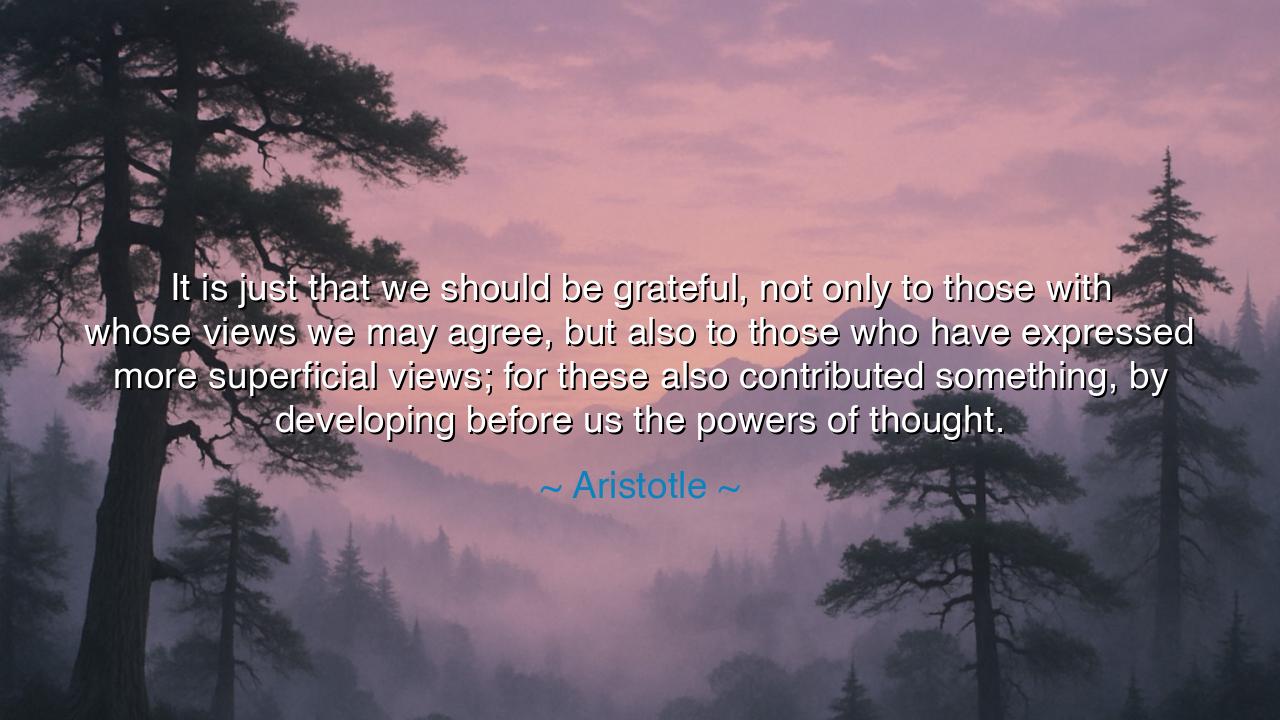
It is just that we should be grateful, not only to those with
It is just that we should be grateful, not only to those with whose views we may agree, but also to those who have expressed more superficial views; for these also contributed something, by developing before us the powers of thought.






Aristotle, the master of reason and the father of many sciences, left us this profound counsel: “It is just that we should be grateful, not only to those with whose views we may agree, but also to those who have expressed more superficial views; for these also contributed something, by developing before us the powers of thought.” In these words, he reminds us that wisdom does not grow in isolation, nor only from agreement, but from the sharpening of the mind through difference and debate. Even flawed or incomplete ideas serve a purpose: they challenge us, awaken our reasoning, and refine our pursuit of truth.
To be grateful for agreement is easy, for it comforts and affirms us. But Aristotle calls us to the higher courtesy of being thankful for opposition as well, for it provokes growth. Just as iron sharpens iron, so too do conflicting views sharpen the intellect. Without resistance, the muscles of thought grow weak; without challenge, the foundations of knowledge remain untested. Even the “superficial” views, those seemingly shallow or mistaken, have value, for they force us to think more deeply, to test, to question, and thus to strengthen our own understanding.
The ancients themselves lived by this principle. Socrates, Aristotle’s forerunner, engaged tirelessly with those who opposed him, questioning not to destroy but to awaken. His dialogues with the Sophists, many of whom offered ideas Aristotle would later dismiss as superficial, nevertheless became the fertile ground from which philosophy itself grew. By wrestling with weaker arguments, truth was clarified. Without the presence of error, wisdom could not shine so brightly.
History gives us countless examples. Consider the debates between Abraham Lincoln and Stephen Douglas. Though Douglas’s arguments for slavery now appear to us deeply flawed, their clash forced Lincoln to sharpen his reasoning, to elevate his rhetoric, and to anchor his positions in moral clarity. The very presence of error pushed forth a clearer vision of justice. Lincoln, like Aristotle, might have said: even from superficial or mistaken views, something valuable was gained—the strengthening of the powers of thought.
Aristotle’s words also carry humility. They remind us that none of us sees truth in its entirety. What seems superficial to us may still contain a fragment of wisdom hidden within. Even the mistaken may, by accident or imperfection, lead us toward discovery. Gratitude in such cases is not for the correctness of their views, but for their role in the great chain of learning, where each voice, whether lofty or shallow, contributes something to the unfolding of knowledge.
The lesson for us is clear: never despise the views of others too quickly. Listen, even when you disagree. Thank those who challenge you, for they are the whetstones of your mind. Be patient with the superficial, for even they may reveal paths you had not considered. Gratitude belongs not only to the teachers who confirm us, but also to the adversaries who unsettle us, for both lead us toward truth.
Practically, let us train ourselves in this discipline. In conversation, do not merely seek agreement, but welcome challenge. When you encounter ideas you deem shallow, resist the urge to dismiss them; instead, ask what they can teach you, what questions they stir, what weaknesses in your own thought they expose. Keep gratitude alive, even for the opposition, for they, too, play their part in your growth.
Thus, Aristotle’s wisdom shines across the ages: gratitude is not only for friends but for rivals, not only for the wise but for the mistaken, for all contribute to the great work of truth. To be thankful even for the superficial is to walk the path of humility, patience, and strength. And those who walk this path will not only grow in knowledge but in wisdom, able to see value even in the voices that oppose them.






AAdministratorAdministrator
Welcome, honored guests. Please leave a comment, we will respond soon